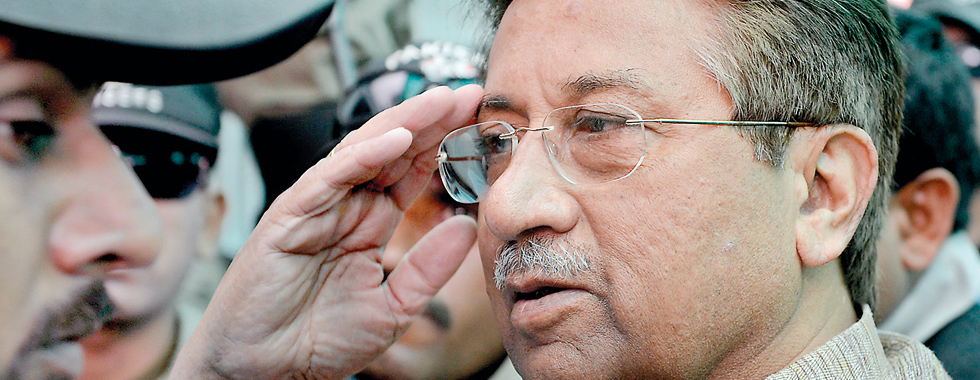News
Musharraf: The culture of impunity collapses
View(s):ISLAMABAD: Pakistan’s former military ruler Pervez Musharraf did not anticipate the doomed homecoming that exposed him to a string of legal charges ranging from murder to conspiracy to murder and facilitation in murder. He was indicted in the murder case of Benazir Bhutto on August 20, nine days after celebrating his 71st birthday.

In this photograph taken on April 20, 2013 former Pakistani president Pervez Musharraf is escorted by soldiers as he salutes on his arrival at an anti-terrorism court in Islamabad. Pakistan's ex-military ruler Pervez Musharraf was on August 20, 2013 indicted on three counts over the 2007 murder of opposition leader Benazir Bhutto, a public prosecutor said. AFP
Now under house arrest, Gen. Musharraf keeps shuttling from one court to another that direct him to appear in person to face the charges of unlawful acts committed under his presidency. The trial of a General is a radical departure from the past in a country where the military has ruled and ruined opponents with little or no care for the consequences.
Musharraf chose to retire into exile in 2008 when he was forced to step down from the position of President by the then newly elected government formed by Pakistan Peoples’ Party of Asif Ali Zardari, the widower of Benazir Bhutto. Zardari replaced Musharraf and gave him a safe exit instead of trying him on the allegations, Benazir Bhutto’s murder being one of them.
As the May 2013 elections neared, Musharraf had decided to return to Pakistan abandoning his glamorous life abroad. He apparently chose domestic political limelight that he had been in for eight consecutive years in an uncontested rule. His decision to break self-imposed exile was a replay of what Benazir Bhutto did. She was murdered on her return and Musharraf has been charged with her murder (among others) on his return.

In October 2007, Benazir Bhutto arrived in Pakistan after a nine-year exile that she ended after brokering a deal with the then ruler, Musharraf, to clear herself and husband of the corruption charges instituted against them by the Nawaz Sharif government in the 1990s. She preferred quitting a secure living abroad for leading her Pakistan Peoples’ Party in the general elections to be held in January 2008 with opinion polls predicting victory for her.
Her homecoming was greeted with two bomb blasts feet away from the truck she rode to lead a mammoth gathering of enthusiastic supporters on the way to her residence in Karachi. Bhutto who served as Prime Minister twice, had narrowly escaped the blasts that left 134 killed and 400 wounded. This followed scores of intelligence reports warning her of security threats from militants.
Bhutto repeatedly complained of insufficient security details from the government and warned that President Musharraf would be held responsible if anything happened to her. She was killed on December 27, 2007 after addressing an election rally in Rawalpindi where the all-powerful army’s headquarters is situated. Other than political unrest, the murder triggered a blame game. Musharraf denied the charges of plotting to murder and blamed Bhutto for ignoring security threats despite repeated warnings.
As Bhutto’s party completed its five-year term in the government, Musharraf decided to stage a comeback, a move that was not taken seriously at public level as he had not kept his past pledges of returning despite repeated claims.
However, the army is known to have urged its former chief to think twice because opinion polls predicted victory for the Pakistan Muslim League (Nawaz) headed by Mian Nawaz Sharif who was ousted by Musharraf. The former military ruler’s reckless decision of removing top judges by declaring emergency did not go well with the people and the judiciary. The media had its own grievances as TV channels were put off the air during the emergency and remained so for more than two months. The judges including the Chief Justice Iftikhar Mohammad Chaudhry who was twice sacked by Musharraf were later reinstated.
Nevertheless Musharraf remained adamant and landed in Karachi on March 23 this year. The same airport had been chosen by Bhutto for her homecoming. Unlike the then opinion polls declaring Bhutto as a popular leader in 2007, Musharraf felt flattered by the ‘likes’ on his Facebook fan page assuming he was still popular. The reality was the opposite.
In contrast to the historic reception of Bhutto, the former military ruler was greeted by only about 200 supporters who were outnumbered by the journalists covering the event.
The moment he set foot in Pakistan, Musharraf started stumbling from one problem to another. His political and legal crisis snowballed. His first challenge was to secure a bail from a court to escape arrest warrant issued in absentia. As he went to attend the court hearing in Karachi, Musharraf was greeted with shoes thrown at him by angry lawyers assembled outside the court room.
The army quietly requested him again not to come to Islamabad as more hostility was awaiting him, according to one of his close associates. He turned a deaf ear.

Soon after he arrived in Islamabad, the Senate, the upper house of Parliament, passed a resolution demanding his trial on treason charges for subverting Pakistan’s Constitution. He came to take part in the elections but a court disqualified him for life on treason charges.
In a July 2009 order, Pakistan’s Supreme Court had declared him a usurper for subverting the Constitution and detaining or dismissing 60 top judges.
The apex court was flooded with petitions on his return demanding his trial. The Islamabad High Court in the meantime ordered Musharraf’s arrest for detaining judges. Musharraf who was present at the time the order was given, ran away from the court’s premises but later surrendered to the Police and was put under house arrest, six years after doing the same with the judges.
The former military ruler was also facing charges of ordering the killing of Baluchistan leader Akbar Bugti in 2006. His arrest warrant was issued in absentia. The case has been reopened.
A judicial commission appointed by the Supreme Court had indicted him on charges of directing a stormy raid on the Red Mosque (in Islamabad) to cleanse it of radical elements. The operation conducted in July 2007 ended in a large-scale massacre, generating widespread public anger and provoking a new wave of bombings by the militants.
While investigations in other cases are in progress, Musharraf has been formally indicted in Banazir Bhutto’s murder case.
The outcome of this sordid episode is yet to be seen. However, the trial has broken taboo in Pakistani politics where nobody ever thought that a General could be put on trial. For the first time in this country’s 66-year history, the walls seem to be closing in on the culture of impunity that has dominated its political direction, the Daily Times said in an editorial on Musharraf’s indictment.
(Umar Cheema is an internationally acclaimed award-winning investigative reporter based in Pakistan)
comments powered by Disqus
